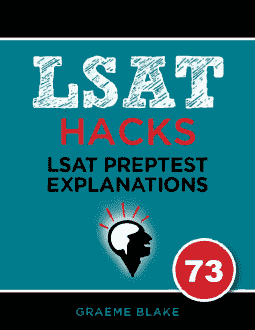QUESTION TEXT: In a recent study of stroke patients, those who…
QUESTION TYPE: Strengthen
CONCLUSION: The leakage of glutamate from nerve cells is a cause of long term brain damage from strokes.
REASONING: Glutamate can harm nerve cells if it leaks.
ANALYSIS: This is a complicated question. There are at least two gaps in the argument.
- The author hasn’t shown that elevated glutamate after a stroke comes from leakages in the brain. The author only said glutamate damages nerve cells when it leaks. If glutamate is elevated for other reasons (e.g. diet) it might be harmless.
- The author hasn’t shown that strokes lead to glutamate leakage. It’s possible a third factor causes both glutamate leakage and strokes.
The right answer patched over the first weakness: it shows that elevated glutamate comes from leakages.
___________
- It doesn’t matter what other neurotransmitters do. The argument is only talking about glutamate, and we already know that glutamate can damage nerve cells.
- It doesn’t matter if other chemical levels are unusual after a stroke. The argument could work even if glutamate is the only unusual chemical.
- It doesn’t matter what other neurotransmitters do. So this answer adds nothing as we already knew glutamate can leak.
- CORRECT. This doesn’t prove the argument correct, but it strengthens it. It eliminates the possibility that glutamate is elevated due to a different reason, such as a dietary excess of glutamate. This therefore shows that excess glutamate can cause damage in the brain because it’s leaking from cells in the brain.
- This doesn’t matter. Not all nerve cells are going to leak glutamate at once. So glutamate could leak from cells that die, and then that glutamate could harm other living cells.


A and D are the same answer and both correct. For the purpose of this passage, neurotransmitter & glutamate go hand in hand. You cannot have one without the other. An answer that uses the word neurotransmitter has a direct, passage supported, inference to glutamate likewise any answer that uses the word glutamate has a direct, passage supported, inference to the word neurotransmitter.
A says: neurotransmitter leak –> damage surrounding cells
D says: Damage –> glutamate leak
A is the incorrect reversal of D, they’re totally different statements. Note that A also talks about all neurotransmitters, whereas D is specific to glutamate.
Note: This is an old comment but I wanted to clarify the point.
I think a better way to explain why D is right is to say that the conclusion specifies that the glutamate in question is leaked from the nerve cells – it isn’t just any old glutamate. This ambiguity is squelched by answer choice D.
Good point!
I was very tempted by E and couldn’t find a way to convince myself that it does not strengthen the argument at all.
I finally accepted to live with the fact that (D) is strengthening the argument in a way more obvious way than (E) does (and the question asks what MOST strengthens the argument).
I can’t think of any plausible reasons to still cast doubt on the argument if (D) is true, whereas I can do it in case (E) is true:
– Who says that nerve cells can’t leak glutamate AFTER being destroyed?
– Even if they couldn’t: according to the stimulus, not only damaged, but also OXYGEN-STARVED cells can leak glutamine. So, even if the self-destruction of the cells and not the glutamate leaked from the damaged cells appears to be the cause, there is still a possibility that the source of the glutamate leakage are oxygen-starved cells, which still contribute to the destruction of surrounding nerve cells and therefore are indeed a cause of long-term brain damage!
“Can” in E is very weak language. It might suggest that it happens 1 in one billion times. That would affect nothing. Answers which have a really weak interpretation tend not to be correct on strengthen and weaken questions.
Of course the real reason E is wrong is because the stimulus is not about the cells that glutamate leaks from. Rather, it is about what happens to surrounding cells when glutamate leaks.
Note: This is an old comment but I wanted to clarify the point.
I recognize that D is better than C, because the conclusion is that glutamate LEAKING FROM DAMAGED CELLS is what is the cause, and this eliminates other possible types of glutamate, but in a general sense, couldn’t you also have said “oh well perhaps there is another NT which is damaging the nerve cells?” and then AC would be a defender in that sense…and would strengthen the argument? Although definitely not as much as D would, that I do admit.
To strengthen this argument, we wouldn’t actually need to rule out the possibility that other leaked neurotransmitters can cause nerve damage. The argument concludes that “glutamate is a cause” of long-term brain damage, not the only cause. So, even if potentially damaging neurotransmitters were present in the blood, our conclusion could still stand.